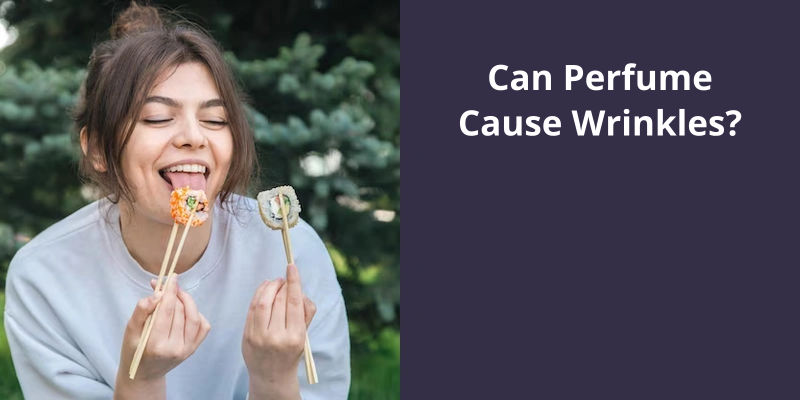Perfume can potentially contribute to wrinkles. The alcohol in perfume can dry your skin, especially if it is sprayed directly onto the face. Dry skin is prone to wrinkle formation. Additionally, some fragrances may contain ingredients called phthalates, which could potentially damage collagen, a protein that keeps your skin elastic and prevents wrinkles. It’s best to spray perfume onto your clothes or hair instead of directly onto your skin to minimize potential risks. However, perfume is not a primary cause of wrinkles; factors like sun exposure, smoking, and poor nutrition contribute more significantly.

Does Putting Perfume on Your Neck Make It Wrinkly?
Many people enjoy wearing perfume as a way to enhance their personal fragrance. However, there’s a common misconception that applying perfume directly on the neck can lead to wrinkles. It’s important to note that this belief isn’t entirely accurate. The real culprit lies in the excessive use of perfume on the neck, causing potential harm to the skin.
Furthermore, certain perfumes contain ingredients such as musk. Musk can make the skin more sensitive to the harmful effects of the sun. Sun exposure has long been known to accelerate the aging process and can lead to the formation of wrinkles. Applying perfume to areas of the body that are more likely to be exposed to sunlight, such as the neck, may exacerbate this sensitivity.
Wrists, for example, are an ideal spot for perfume application. The skin on the wrists is typically less sensitive and less likely to be exposed to direct sunlight, reducing the chances of any adverse effects.
It’s important to be mindful of the amount of perfume being applied and choose areas of the body that are less likely to be exposed to the sun. By doing so, you can continue to enjoy your favorite fragrance without worrying about potential damage to your skin.
How to Properly Apply Perfume to Avoid Skin Damage
When it comes to applying perfume, it’s important to do so properly to avoid potential skin damage and the formation of wrinkles. Here are a few tips to keep in mind:
- Spray perfume on your clothes or hair instead of directly on your skin. This can help prevent any potential irritation or allergic reactions.
- Avoid applying perfume to exposed areas of the skin that are already dry or have any existing skin conditions, as this could further exacerbate the issue.
- Consider using a moisturizer or unscented lotion on your skin before applying perfume. This can create a barrier and help protect your skin from any potential irritation.
- If you prefer to apply perfume directly to your skin, do a patch test first. Apply a small amount to a discreet area and wait to see if any redness or irritation occurs before using it more extensively.
- Additionally, be mindful of the ingredients in your perfume. Some fragrances may contain alcohol or other drying agents that could potentially contribute to skin damage over time. Opt for perfumes with more natural or moisturizing ingredients.
By following these tips, you can enjoy your favorite scents without worrying about potential skin damage or the formation of wrinkles.
While perfumes add a delightful touch to our daily lives, it’s important to be aware of their potential long-term effects. Some detrimental consequences linked to perfume usage include contact dermatitis, contact urticaria, and photo allergy and photo toxicity. Moreover, cosmetics in general can lead to complications such as lung disease, damage to reproductive organs, skin allergies, excessive hair problems, headaches, and, in severe cases, even cancer. It’s crucial to consider these factors and prioritize one’s well-being when using fragrances and cosmetic products.
What Are the Long Term Effects of Wearing Perfume?
Many people enjoy wearing perfume to enhance their personal scent and boost their confidence. However, it’s important to consider the potential long-term effects of using perfumes regularly. While perfumes can be a delightful addition to our daily routines, they can also contribute to various health issues.
One common side effect of perfume usage is contact dermatitis, which is a skin condition characterized by redness, itching, and inflammation. This occurs when the skin comes into direct contact with certain fragrance ingredients, resulting in an allergic reaction. Contact urticaria is another potential issue, where individuals experience hives or welts upon exposure to perfume.
Additionally, some perfumes contain ingredients that can cause photo allergy and photo toxicity when exposed to sunlight. This means that wearing such perfume outdoors can increase the risk of skin irritation, rashes, and even sunburn. Therefore, it’s crucial to select perfumes with caution and be mindful of sunlight exposure.
Moreover, the detrimental effects of cosmetics, including perfume, aren’t only limited to the skin. Inhalation of certain fragrance chemicals can potentially lead to lung diseases, especially when used in high concentrations or over a prolonged period. Furthermore, some perfume ingredients have been linked to damage in reproductive organs, posing a risk to fertility and overall reproductive health.
Individuals with sensitive skin or a history of allergies are particularly susceptible to these negative effects. Excessive use of perfumes can also lead to hair problems, including dryness, breakage, and loss, due to the potential drying and irritating effects of certain fragrance ingredients.
Lastly, although further research is required to determine a definitive link, some studies have suggested a potential correlation between certain perfume ingredients and headaches or migraines. Moreover, there have been concerns raised about the potential carcinogenic properties of certain fragrance chemicals, highlighting the need for more extensive research to ensure consumer safety.
Therefore, it’s advisable to select perfumes carefully, consider those with minimal fragrance ingredients, and avoid excessive use to minimize the potential of detrimental effects on our health and well-being.
Therefore, it’s crucial to understand the potential effects of fragrance on the skin, especially when it comes to aging.
Does Fragrance Age Your Skin?
Fragrances, although a popular addition to our daily routines, may have a negative impact on our skin. According to renowned dermatologist Dr. Cheryl Rosen, the ingredients found in synthetic fragrances can lead to skin irritation, inflammation, and oxidative damage. These factors can ultimately speed up the aging process of our skin.
Skin irritation caused by fragrances can manifest as redness, itching, and even allergic reactions. This constant irritation can weaken the skins natural barrier, making it more susceptible to other environmental aggressors, such as UV rays and pollution. Furthermore, inflammation resulting from fragrance ingredients can disrupt the skins collagen production, leading to the formation of wrinkles and fine lines.
In addition, oxidative damage caused by synthetic fragrances can contribute to the aging process. Oxidative stress occurs when free radicals overwhelm the bodys ability to neutralize them, leading to cellular damage and premature aging. This oxidative damage can break down collagen and elastin fibers, essential components for maintaining skins firmness and elasticity.
Moreover, fragrances can also interact with sunlight to create photosensitizing reactions on the skin. This means that when exposed to sunlight, the skin may become more prone to sunburns, pigmentation issues, and an overall accelerated aging process. Therefore, it’s crucial to avoid wearing fragrances during prolonged sun exposure to minimize these effects.
It’s prudent to be cautious of the fragrances we use on our skin. Opting for fragrance-free or natural options may be a wiser choice for those concerned with maintaining their skins youthfulness and preventing wrinkles.
Not only is it common knowledge that spraying perfume on your neck is a popular choice, but there’s also another interesting option to enhance your scent. The idea of wearing a fragrance-infused necklace is gaining popularity, allowing you to encapsulate an aroma that lingers on your neck throughout the day.
Is It Bad to Spray Perfume on Your Neck?
When it comes to the question of whether it’s bad to spray perfume on your neck, there are a few important factors to consider. First and foremost, it’s essential to ensure that the perfume you’re using is safe for skin application. It’s always a good idea to read the labels and test the perfume on a small area of skin before applying it to your neck.
Aside from potential skin reactions, there’s a popular belief that continued application of perfume on the neck can cause wrinkles. The skin on the neck is delicate and more prone to wrinkles than other areas of the body. However, there’s limited scientific evidence to support the notion that perfume alone can cause wrinkles. Wrinkles typically form due to natural aging, sun damage, and repetitive facial expressions.
Avoid excessive spraying or rubbing, as this can irritate the skin and potentially lead to wrinkles. Additionally, it’s crucial to take care of your skin by keeping it moisturized and protected from the sun to minimize the risk of developing wrinkles.
For those who want to enhance the fragrance on their neck, wearing a necklace that contains a specially made fragrance can be a great alternative. These necklaces are designed to hold and release the scent throughout the day, ensuring that your neck smells good without the need for direct perfume application. This can be a stylish and convenient way to enjoy the benefits of a pleasant fragrance while minimizing potential skin-related concerns.
How to Properly Apply Perfume to Maximize It’s Longevity and Scent.
- Start with clean, moisturized skin.
- Apply perfume right after showering, while your skin is still damp.
- Spray perfume on pulse points, such as wrists, neck, and behind the ears.
- Don’t rub your wrists together after applying perfume.
- Avoid spraying perfume directly onto clothing.
- For a more subtle scent, spray perfume into the air and walk through the mist.
- Consider using a fragrance-free moisturizer before applying perfume to help it last longer.
- Store your perfume in a cool, dark place to preserve it’s quality.
- Avoid exposing your perfume to extreme heat or sunlight.
- Reapply perfume throughout the day, if desired, to maintain the scent.
Conclusion
While further research is needed to fully understand the mechanism behind this phenomenon, it’s essential to approach perfume usage with caution.





